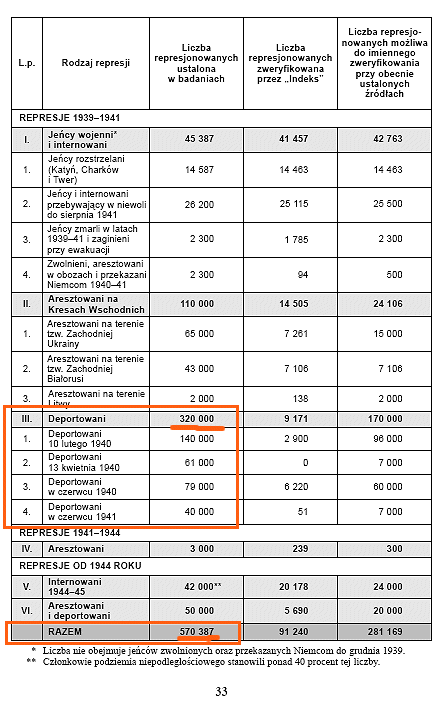Well, this civilians are in part II position 1 and 2. “Arrested on Kresy Wschodnie”
In coment to this list on web Karta http://www.indeks.karta.org.pl/represje_sowieckie_4.html is info. that 3435 peoples from soviet prison on West Ukrain was mourdered and list with personal names was give by Ukrainians. 3870 peoples from West Belorussian was mourdered but list with personal names was “lost”.
Originally Posted by 1PUK
http://www.polskieradio.pl/zagranica...aspx?iid=50569
Today marks the 67th anniversary of the Katyn massacre.
In 1940 the Stalinist NKVD secret police executed over 20 thousand
Polish army and police officers, who had been held in POW camps in
Ukraine since the Soviets invaded Polish territory in September 1939,
on the basis of the Ribbentrop-Molotov pact signed with the Nazis.
Hello mate Polar.
Tell me please how many time more you will call the west Ukraine and Belorussian territories as Polish?
Is it a polish historic imperialism? Or simply short memory?
BTW can you explain the fact that whole 2 years Nazy did not noticed to the Katyn untill 1943 when they “suddenly” found the graves?
Chevan I don’t wrote this post but I answer for you question. In september 1939 Soviet Union invade Poland and what is name and who belonged this territory now don’t changed this fact.
BTW can you explain the fact that whole 2 years Nazy did not noticed to the Katyn untill 1943 when they “suddenly” found the graves?
Sorry I don’t know why Nazi don’t found this graves in 1941 or 1942. Mayby they don’t looking this graves. If you ask did “Katyn massacre” was use as excellent propaganda tools by Nazi. My answer is yes, but you remember that not changed fact who did this massacre and who is resposible for that.
BTW not only Nazi try use “Katyn massacre” as excellent propaganda tools
http://en.wikipedia.org/wiki/Katyn_massacre
Soviet trials
From December 29, 1945 to January 5, 1946, ten officers of the German Wehrmacht – Karl Hermann Strüffling, Heinrich Remmlinger, Ernst Böhm, Eduard Sonnenfeld, Herbard Janike, Erwin Skotki, Ernst Geherer, Erich Paul Vogel, Franz Wiese, and Arno Dürer – were tried by a Soviet military court in Leningrad. In what is now widely considered a show trial, they were falsely charged for an alleged role in the Katyn massacre. The first seven officers were sentenced to death and executed by public hanging on the same day. The other three were sentenced to hard labor, Vogel and Wiese to 20 year terms each and Dürer to 15 years.[38] Dürer is said to have pleaded guilty at the trial and to have returned to Germany later, the fate of the others sentenced to hard labor remains unknown.[39][dubious — see talk page]
In 1946, the chief Soviet prosecutor at the Nuremberg Trials, Roman A. Rudenko, tried to indict Germany for the Katyn killings, stating that “one of the most important criminal acts for which the major war criminals are responsible was the mass execution of Polish prisoners of war shot in the Katyn forest near Smolensk by the German fascist invaders”,[40] but dropped the matter after the United States and United Kingdom refused to support it and German lawyers mounted an embarrassing defense.[1][41]
German WWII propaganda poster (in French) exploiting the massacre. The text reads: If the Soviets win the war! Katyn everywhereMore specifically, presented by the Soviet charge the Burdenko report, in spite of the reserves[42]of the Anglo-Saxons, was accepted on grounds of the article 21[43] and coded as URSS-54. The German White Book of 1943 was accepted on grounds of the article 19[44] with, as had underlined it the president of the court,[45] a potential convincing value; the course of the debates would make this adjective pointless. The intransigence of the Soviets to reveal Katyn in the bill of indictment was driven by the final objective: to quote it in the verdict. To this end, summoning of some witnesses was refused.[46]
However, the problem to be addressed by the court was not to allot the responsibility for the massacre to Germany or the Soviet Union, but to attribute the crime to at least one of the twenty-four dignitaries of the Nazi state.[47] The task of the charge was thus to establish a link between the reproached acts and the defendants. On hearings, however, the Soviet prosecutor proved to be unable to name the person in charge for the execution of the massacre[48], as well as the supposed guilty among the defendants[49].
In spite of this bankruptcy of the charge, Nikitchenko tried to make pass in force the Soviet point of view and did not hesitate to claim the inadequacy of the statutes of the court. This failed and the name of Katyn did not appear in the verdict.





 Ha Ha
Ha Ha